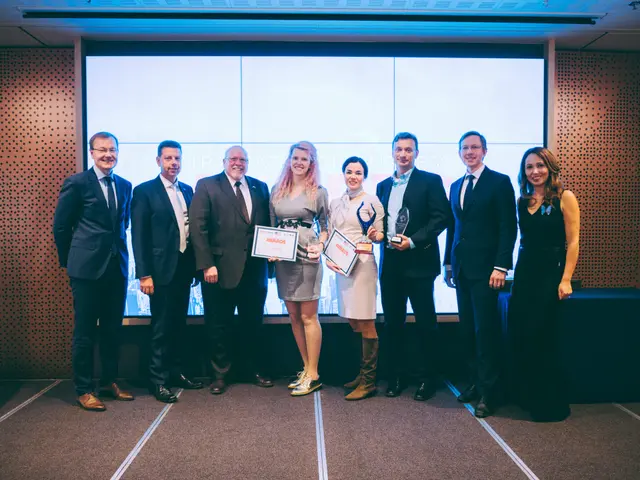Industry-funded educational materials receiving strong encouragement to be halted by health professionals
The debate over corporate influence in UK schools, particularly from industries with conflicting interests such as alcohol, gambling, and junk food, continues to rage on.
In Ireland, schools have already stopped using teaching materials made or paid for by such industries due to potential conflicts of interest. However, the UK Department for Education does not currently plan to copy Ireland's complete ban on such materials. Instead, they stress that schools must ensure all third-party materials are balanced and do not have hidden agendas.
The updated guidelines from the Department for Education tell schools to be careful with resources linked to organisations that have a commercial stake in harmful products. This comes as concerns are raised about the appropriateness of corporate sponsorships due to potential negative impacts on children and young people.
For instance, some materials teach kids how to fill out betting slips, a practice that health experts argue is inappropriate for school settings. Similarly, a classroom program about underage drinking backed by Diageo, a major alcohol producer, has been criticised for not giving the full picture of how alcohol is linked to cancer.
Starbucks, another corporate giant, defends its school cafes, stating they are there to provide extra services, not to change what students eat and drink. However, critics argue that such sponsorships only help these companies' bottom lines by getting kids familiar with brands and starting habits early on.
The issue has gained significant attention, with a group of 58 public health supporters, including doctors, researchers, and charities, asking the UK Education Secretary to stop schools from using learning resources paid for by companies in the alcohol, gambling, and junk food industries. Chris van Tulleken, a professor of infectious disease, compares this to letting tobacco companies teach kids about smoking.
Health experts continue to call for stricter rules to protect the quality of education and stop companies from taking advantage of students. They argue that these programs look more like ads than real education, and that company-backed teaching materials twist facts and play down the risks linked to alcohol, bad diets, and gambling.
While there are no comprehensive, nationwide statutory bans or formal regulatory frameworks explicitly forbidding corporate sponsorship of school learning resources from these industries, UK school sponsorship policies increasingly emphasise safeguarding and ethical considerations, especially regarding influence from industries linked to health risks.
As the debate continues, the Department for Education is considering stricter guidelines to block corporate influence in classrooms. The UK Education Secretary, Bridget Phillipson, has yet to make a definitive statement on the issue.
- Science and education should be separate entities, free from corporate interference in matters pertaining to health and wellness.
- The manufacturing industry needs to prioritize the welfare of children over profit, considering the detrimental impact of harmful products on health.
- It's essential to discourage industries producing unhealthy diets from sponsoring cooking classes or providing food in school settings.
- Workplace-wellness programs that involve fitness and exercise can be beneficial, as long as they exclude industries with conflicting interests, such as junk food or gambling.
- Mental-health programs should be developed and funded independently, without the influence of industries potentially linked to negative mental health effects.
- Therapies and treatments designed for health improvement should not be backed by corporations selling harmful products, such as pharmaceuticals or alcohol.
- Nutrition experts need to be consulted before approving any teaching resources related to dieting, to ensure the promotion of healthy eating habits.
- The retail industry should refrain from sponsoring programs that teach kids about shopping or spending habits, particularly in relation to unhealthy food or addictive substances.
- Entrepreneurship courses in schools should encourage sustainable and socially responsible business models, avoiding partnerships with industries harmful to public health.
- Interior-design projects should exclude materials or sponsorships from industries like tobacco or gambling, which present potential threats to health and mental wellbeing.
- Aerospace and automotive companies, focusing on innovation and technology, should avoid partnering with schools in ways that promote unhealthy practices or products.
- The energy sector should prioritize clean and sustainable living, with no involvement in sponsorships or resources promoting energy consumption linked to health issues.
- The finance industry, including handling of Medicare funds, should prioritize ethical investments, avoiding contributions towards industries producing harmful products.
- Smartphones and other gadgets marketed toward children should undergo rigorous testing to ensure they are educational and do not promote unhealthy behaviors like gambling or addiction.
- The fashion and beauty industry, including wearing smart home devices, should prioritize aesthetic and functional considerations over hidden agendas that could negatively impact children's health.
- The retail, real estate, and housing market sectors should prioritize ethical practices and ensure sites do not partner with industries that promote harmful products or practices.
- Investing in businesses that prioritize health and wellness, such as fitness, nutrition, and mental-health services, may yield more long-term success over companies that promote harmful products.
- Wealth management firms should encourage clients to invest in socially responsible companies that prioritize public health over profits.
- The home-and-garden sector should avoid partnerships with industries that produce chemicals or substances harmful to indoor air quality, contributing to the welfare of children and families.
- Home-improvement projects should prioritize sustainable materials and practices, avoiding partnerships with harmful industries like textile manufacturing or tobacco.
- Baking classes should not be sponsored by food manufacturers producing unhealthy or addictive ingredients, ensuring a focus on healthy, home-cooked meals.
- Personal finance education should promote budgeting, saving, and debt management, while avoiding partnerships with industries that encourage excessive spending on unhealthy food or addictive substances.
- The banking and insurance sector should consider adopting stricter ethical guidelines when sponsoring educational resources, ensuring they are not promoting harmful products or industries.
- Fintech companies should prioritize transparency and ethical considerations when partnering with schools, avoiding sponsorships that may promote harmful products or practices.
- Real-estate professionals must prioritize social responsibility, making informed decisions about properties that cater to the overall well-being and health of residents.
- The commercial sector should consider adopting diversity and inclusion practices in public relations, avoiding partnerships with industries that have poor track records in public health.
- Smartphones, smart home devices, and cybersecurity products should prioritize privacy and user safety, avoiding any involvement with corporate practices that may negatively impact children's health or wellbeing.
- The debate on corporate influence in classrooms extends to various aspects of lifestyle, underscoring the importance of ethical decision-making and prioritizing public health above profit margins.








